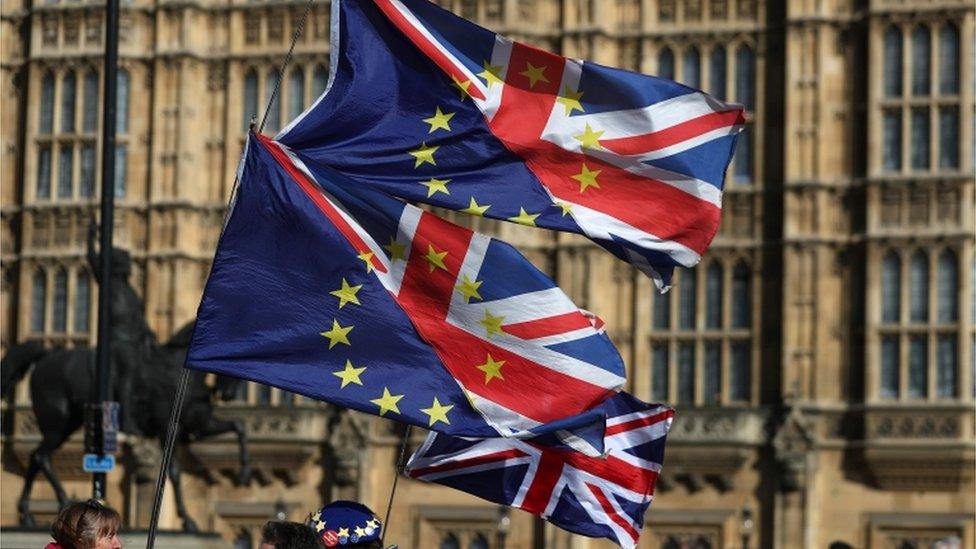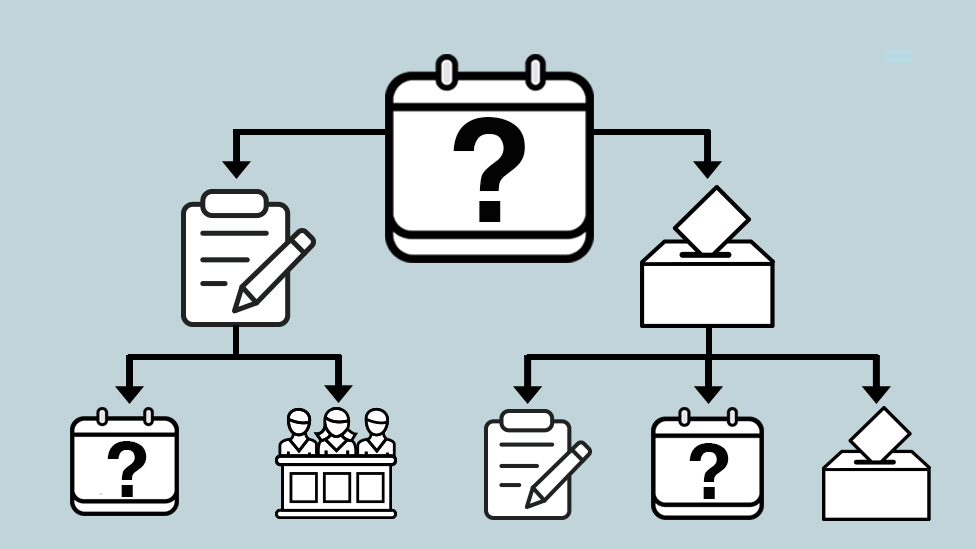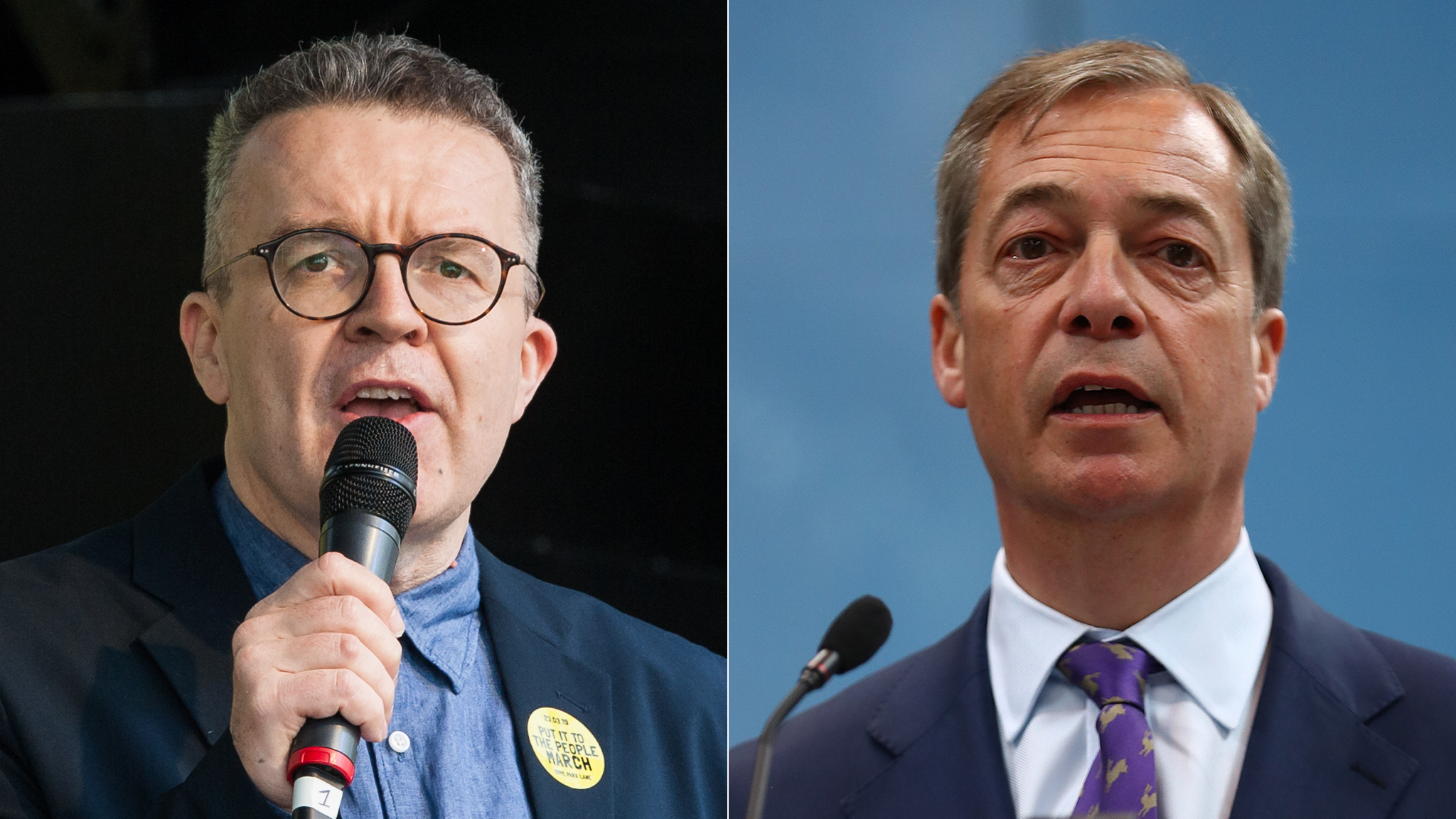Brexit: Cross-party deal must include new referendum - Sir Keir Starmer
- Published
- comments
Michael Gove resists calls to set a deadline for the talks
A cross-party Brexit deal will not get through Parliament unless it is subject to a fresh public vote, shadow Brexit secretary Sir Keir Starmer says.
Talks between Labour and ministers over leaving the EU have been going on for a month with little sign of progress.
Sir Keir told the Guardian, external that without a new referendum up to 150 Labour MPs would vote against any agreement made.
Environment Secretary Michael Gove suggested Labour needed more time to come to terms with the idea of a deal.
"For some in the Labour Party it will be a significant step to accept supporting Brexit and to come behind the prime minister's approach," he told the BBC.
After talks broke up on Monday evening, a Labour spokesperson said the shadow cabinet would be updated on what had been discussed.
The BBC's Iain Watson said: "It sounds like the plug has not been pulled on these yet, but it doesn't sound as if there's substantial progress to report."
A Downing Street spokesperson said: "In preparation for an update to cabinet tomorrow, today's meeting took stock across the range of issues discussed in talks over the last few weeks".
"We continue to seek to agree a way forward in order to secure our orderly withdrawal from the EU."
The UK was due to leave the EU on 29 March but the deadline was pushed back to 31 October after MPs rejected Theresa May's proposed deal three times.
Talks between the government and Labour aimed at finding a way to end the impasse resumed on Monday, with pressure growing on both sides to show progress or pull out.
Allow X content?
This article contains content provided by X. We ask for your permission before anything is loaded, as they may be using cookies and other technologies. You may want to read X’s cookie policy, external and privacy policy, external before accepting. To view this content choose ‘accept and continue’.

No 10 said there was a "clear desire" to get on with the process. Asked if there was a deadline, a spokesman said: "Let's see where we get to this evening."
If there is no agreement, Theresa May has said she will return to Parliament and ask MPs to vote again on a range of possible options.
The deputy Labour leader urges voters to reject "nationalism" and "populism" in the EU elections
Parliament failed to unite behind a way forward in a series of "indicative votes" in March, but the PM says the government would now be prepared to accept whatever commanded a majority, so long as Labour did too.
Sir Keir said he would not be afraid to end the talks as soon as this week if the PM did not budge on her so-called red lines - positions that she feels cannot be changed in the Brexit deal.
He suggested a referendum on the final deal had become a red line of its own for many Labour MPs, saying "A significant number, probably 120 if not 150, would not back a deal if it hasn't got a confirmatory vote."
Labour's stated policy is that it supports a further referendum on Brexit under certain circumstances.
It has rejected the idea of campaigning for one in any event but will demand a public vote if it cannot get changes to the government's deal or an election.
Labour's Stephen Kinnock, who backs the UK leaving but retaining the closest possible economic links with the EU, said it would be a "real shame" if the talks were "torpedoed" by his party's insistence on another referendum.
"If you try to insert a second referendum into these talks they won't get through because the Conservatives will not whip their MPs to support it," he told Radio 4's World At One.
However, Labour's deputy leader, Tom Watson, said another public vote was the only "way out" of the current stalemate.
Lord Adonis: "The great majority of people do want a referendum - that's very clear from the polling."
Asked whether Labour wanted to leave or remain in the EU, he told Radio 4's Today: "We are a remain and reform party," but "when it comes to a deal people can form their own view."
In a speech later marking the 25th anniversary of former Labour leader John Smith's death, Mr Watson reflected on Mr Smith's pro-Europeanism and said he would have backed a "People's Vote".
Asked if a deadline should be set for the talks, Mr Gove said the government needed time to properly "understand and explore" Labour's position.
While another referendum would be a "bad idea" he said, Mr Gove declined to rule out any of Labour's main proposals, such as some form of customs union with the EU.

Can cross-party talks continue for much longer?

The reality is these talks have been genuine, but very difficult.
Neither side wanted to pull the plug before the local elections 10 days or so ago.
But now, as time goes on, it may well be we are reaching the moment where they have to throw up their hands and say: "We just can't do it."
Jeremy Corbyn and Theresa May are both on lonely tightropes trying to get across the other side of this slow-moving crisis. I think they would both like it to be over with, maybe with a cross-party deal.
But the prime minister doesn't want to put a huge compromise on the table, she doesn't want another referendum. Jeremy Corbyn doesn't want to help out the government unless he can get genuine changes.
If neither of them feel they can really budge, well, the talks are not going to be able to succeed, and the government will then have to try to move on to votes in Parliament, the next part of the process.

Labour's position on Brexit
June 2017 - Labour's general election manifesto accepts referendum result
March 2018 - Shadow Northern Ireland secretary Owen Smith sacked for supporting second referendum on final deal
September - Labour agrees if a general election cannot be achieved it "must support all options… including a public vote"
18 November - Labour leader Jeremy Corbyn says a new referendum is "an option for the future" but "not an option for today"
28 November - Shadow chancellor John McDonnell says Labour will "inevitably" back a second referendum if unable to secure general election
16 January 2019 - 71 Labour MPs say they support a public vote
6 February - Mr Corbyn writes a letter to Mrs May outlining five changes with no mention of a "People's Vote"
28 February - Labour says it will back a public vote after its proposed Brexit deal is rejected
14 March - Five Labour MPs quit party roles to oppose a further referendum
27 March - The party backs a confirmatory public vote in Parliament's indicative votes on a way forward for Brexit
30 April - Party agrees to demand a public vote if it cannot get changes to the government's deal or an election, as it decides wording to EU election manifesto

- Published26 April 2019

- Published13 July 2020

- Published21 April 2019

- Published30 December 2020
